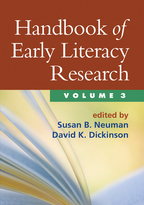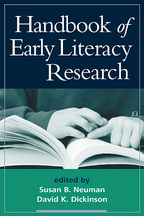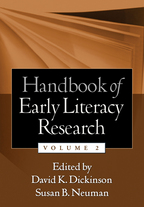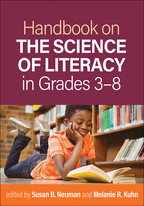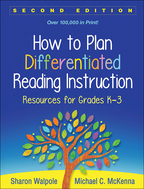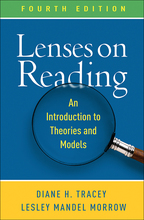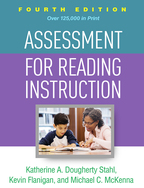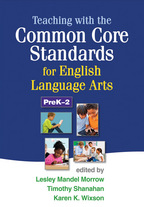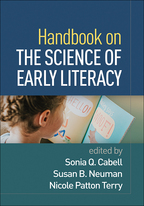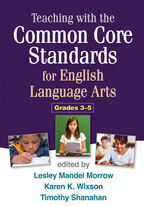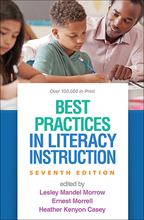Handbook of Early Literacy Research, Volume 3
Edited by Susan B. Neuman and David K. Dickinson
Paperbacke-bookprint + e-book
Paperback
orderOctober 10, 2011
ISBN 9781462503353
Price: $69.00467 Pages
Size: 7" x 10"
Copyright Date: 2011
“This highly readable text conveys cutting-edge thinking about the issues, theory, and research on emergent literacy and the implications for practice inside and outside the classroom. Focusing on the period between birth and the formal teaching of reading, the authors describe all aspects of early language and literacy learning, including topics like promising avenues for assessment, parent-child interactions, and supporting English language learners and children with language and reading challenges.”

—Young Children
“Volume 3 of the Handbook elaborates on research topics introduced in Volumes 1 and 2, presenting cutting-edge thinking in a style accessible to teacher educators as well as researchers. Addressing the relation between oral language and literacy development in diverse populations, professional development for early childhood teachers, and effective interventions for our youngest learners, this is an invaluable reference on some of the most pressing issues in education today.”

—Anne McGill-Franzen, Ph.D., Professor and Director of the Reading Center, University of Tennessee, Knoxville
“Readers will find a wealth of research findings and evidence-based practices in chapters from national and international experts. The selection of topics makes this handbook essential reading for those seeking the most current thinking in the field. The content readily flows from one chapter to another and builds in a cohesive manner throughout the book, rewarding the reader with nuanced conceptual discussions and practical implications for home and school. Neuman and Dickinson have again raised the bar on early literacy research and practice.”

—Barbara Hanna Wasik, PhD, William R. Kenan, Jr. Distinguished Professor, School of Education, University of North Carolina at Chapel Hill
“This handbook is a virtual library of cutting-edge knowledge on all aspects of the fast-moving field of emergent literacy. Like Volumes 1 and 2, Volume 3 helps us understand how literacy and language unfold for diverse populations of children. The book describes promising avenues for assessment and intervention as well as the professional development that is necessary to bring effective practices to scale. This handbook will be a 'go-to' resource for the entire range of professionals and students seeking to nurture the next generation of successful readers.”

—Judith J. Carta, PhD, Juniper Gardens Children's Project, University of Kansas
“This book offers fresh evidence and rich insights about how we, as a society, can better advance the oral and written language skills of young children. Breathtaking in scope, the volume presents new understandings of how children puzzle through the elements of language and identifies what programs work best to nurture early learning. Truly a 'must read' for educators, developmentalists, policymakers, and all those who aim to give young children a head start.”

—Bruce Fuller, PhD, Graduate School of Education, University of California, Berkeley
—Young Children
“Volume 3 of the Handbook elaborates on research topics introduced in Volumes 1 and 2, presenting cutting-edge thinking in a style accessible to teacher educators as well as researchers. Addressing the relation between oral language and literacy development in diverse populations, professional development for early childhood teachers, and effective interventions for our youngest learners, this is an invaluable reference on some of the most pressing issues in education today.”
—Anne McGill-Franzen, Ph.D., Professor and Director of the Reading Center, University of Tennessee, Knoxville
“Readers will find a wealth of research findings and evidence-based practices in chapters from national and international experts. The selection of topics makes this handbook essential reading for those seeking the most current thinking in the field. The content readily flows from one chapter to another and builds in a cohesive manner throughout the book, rewarding the reader with nuanced conceptual discussions and practical implications for home and school. Neuman and Dickinson have again raised the bar on early literacy research and practice.”
—Barbara Hanna Wasik, PhD, William R. Kenan, Jr. Distinguished Professor, School of Education, University of North Carolina at Chapel Hill
“This handbook is a virtual library of cutting-edge knowledge on all aspects of the fast-moving field of emergent literacy. Like Volumes 1 and 2, Volume 3 helps us understand how literacy and language unfold for diverse populations of children. The book describes promising avenues for assessment and intervention as well as the professional development that is necessary to bring effective practices to scale. This handbook will be a 'go-to' resource for the entire range of professionals and students seeking to nurture the next generation of successful readers.”
—Judith J. Carta, PhD, Juniper Gardens Children's Project, University of Kansas
“This book offers fresh evidence and rich insights about how we, as a society, can better advance the oral and written language skills of young children. Breathtaking in scope, the volume presents new understandings of how children puzzle through the elements of language and identifies what programs work best to nurture early learning. Truly a 'must read' for educators, developmentalists, policymakers, and all those who aim to give young children a head start.”
—Bruce Fuller, PhD, Graduate School of Education, University of California, Berkeley

